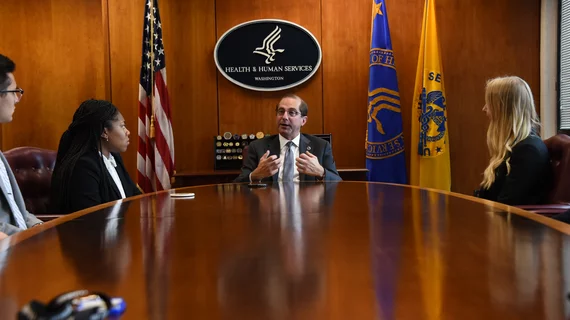Trump administration’s assault on drug prices stuck on Twitter
HHS Secretary Alex Azar has a demand for the pharmaceutical industry: “Prices must start coming down.”
The healthcare chief made the remark via Twitter, specifically targeting list prices of drugs as more than three dozen drugmakers raised prices on hundreds of medicines at the start of 2019, The Wall Street Journal reported.
However, the message––which was published a day after Trump called a meeting with White House officials on the issue––didn’t come with any new proposals or plans from the agency he leads. The Twitter action also arrived a day before Democrats in Congress planned to introduce a legislative package to “drastically” reduce drug prices.
“All options are on the table,” Azar stated on Twitter. “We will continue with more regulatory and legislative proposals, and we will work with Democrats and Republicans, until we see list prices come down.”
Azar’s Twitter engagement echoed calls by President Trump to lower drug prices and put pressure on specific drugmakers. In July 2018, Trump publicly attacked Pfizer over its planned price increases on several prescriptions. Shortly after, Pfizer announced it would pause those increases, but the company pushed forward with the move at the start of 2019.
On average, drug prices increased 6.3 percent in 2019, the WSJ reported, which Azar referred to as “smaller and fewer” than price hikes reported at the start of 2018.
Via Twitter, Azar also acknowledged some pharma companies by name for their “good behavior,” including Merk, Gilean and Amgen. Merk, which similarly came under fire by Trump, stated it would lower prices on some––but not all––of its drugs by 10 percent or more last year. However, its top-selling, expensive cancer and diabetes products wouldn’t see a price change, according to The New York Times.
The heightened attention on the issue also comes on the heels of a new study that found costs are higher in part because drug companies are raising prices, not from new innovations as the pharma industry frequently claims. The prevalence of drug advertising has exploded, with medical marketing approaching $30 billion in 2016.
Administrative actions
While Trump’s Twitter attack on Pfizer had a temporary result in 2018, long-term impacts on drug prices from the administration’s efforts have yet to be realized as the president and agencies continue to ramp up new policy proposals.
One such proposal from the administration would lower costs of Medicare Part B prescription drugs, which are typically administered in physicians’ offices and other healthcare facilities, by basing reimbursements on an international pricing model. HHS referred to this action as “cutting down on foreign freeloading.”
In addition, HHS proposed a rule in October 2018 that forces drugmakers to publish the prices of medicines in television ads. However, the rule has been called out for having no teeth after it was revealed the agency would have no mechanism to enforce it. The proposal also requires drugmakers to publish wholesale acquisition costs, or the list price, which often does not reflect what consumers typically pay.
Azar himself comes from big pharma, previously working as an executive for global drugmaker Eli Lilly since 2007. The company is the largest manufacturer of psychiatric medications such as Prozac, and a top maker of diabetes treatment drugs.
In 1996, the list price of a vial of insulin made by Eli Lilly cost $21. Today, the same vial costs $275, according to a report by The New York Times published Jan. 7. Eli Lilly was also named with other companies in a lawsuit accusing the industry of price fixing insulin to keep costs high.
In the first few weeks of 2019, Eli Lilly was among the first to adhere to CMS’ proposal, airing an ad for a type 2 diabetes medication, Trulicity, that directed consumers to a website about the drug for pricing information. The list price of the drug, without insurance, is about $730 for a one-month supply, according to Eli Lilly.

